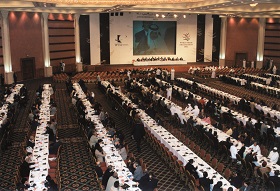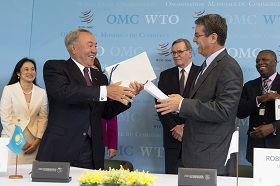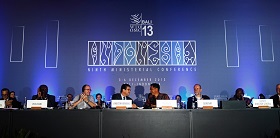WTO: Is There Hope for a Sinking Ship?
In
Login if you are already registered
(no votes) |
(0 votes) |
Doctor of Economics, Professor, Department of International Economic Relations and Foreign Economic Relations, MGIMO University
The Doha Round of trade negotiations within the World Trade Organization (WTO) began 15 years ago. However, no tangible progress has been made in the resolution of some of the most enormous challenges that the global trading system is facing now, during a most controversial – both economically and politically – development phase.
The WTO’s 10th Ministerial Conference will be taking place on 15–18 December 2015; however, the organization does not seem to be in its best shape in the run up to the event.
The Doha Round of trade negotiations within the World Trade Organization (WTO) began 15 years ago. However, no tangible progress has been made in the resolution of some of the most enormous challenges that the global trading system is facing now, during a most controversial – both economically and politically – development phase. Nevertheless, experts seem to make a point when they say that despite discrepancies in the matters of the regulation of international trade between individual WTO member states, over the twenty years since its inception the organization “has proven its competence as the major and most massive forum for discussing the most complicated and challenging topics in trade relations between individual countries and their formal and informal associations.” [1] However, the to-do list to ultimately improve the rules for global trade has not only failed to become shorter, but, on the contrary, acquired new, more complicated, tasks. The current state of affairs within the WTO looks like a snowball: now that its member states are making efforts to address last decade’s challenges, every year new problems emerge that require immediate solutions in order to support stability in global trade and the world as a whole.
The most complicated issues for discussion that will hardly be effectively resolved include the increasingly severe confrontation between regionalism and multilateral cooperation.
As any international project, the Doha Round agenda was supposed to undergo changes in the course of time due to dynamic development and emergence of new challenges to the global economy and international economic cooperation. It became necessary to modify the mechanism for settling disputes and identify a new approach to the provision of trade preferences based on regional and cross-regional agreements on preferences. It became apparent that multilateral rules required major transformations in the wake of the dynamic evolution of global production chains (global value chains) and advent of the brand “Made in the world.” Additional challenges were caused by the system for the identification of the country of origin that was not finalized within the WTO. As a result, certain progress was made, albeit not without difficulty and compromise. The agreement on the simplification of trade procedures confirmed yet again that multilateral trade negotiations are the best way to formulate rules and ensure stability and development.
At the same time, the past 24 months turned out to be critical for the WTO – for the first time ever, doubts were voiced, including at the level of experts, that the organization was viable. Protectionism in the form of trade sanctions has been reanimated, increasingly frequent attempts to make use of the GATT Article XXI provisions to justify limitations have been reported, and multilateral principles have been eroded within the framework of plurilateral arrangements, to the extent of the appearance of negotiating platforms other than the WTO, albeit within its competence. This applies to the negotiations of the Trade in Services Agreement (TISA) initiated by the United States as a possible alternative to the General Agreement on Trade in Services (GATS). Initially 16 countries were engaged; however, their number has increased to 23. Because the European Union represents 28 member states, we can assume that 50 countries are involved in the talks.
Agenda: a Review or New Lessons?
The WTO is approaching its Tenth Ministerial Conference that will be held in Nairobi, Kenya, from 15 to 18 December 2015, with a track record that is far from being optimistic.
The agenda covers a broad range of issues. Primarily, the participants will address the development of agriculture (application of export subsidies, special safeguards, formation of food stocks, etc.) and protection of the domestic market (antidumping measures, provision of subsidies). The mechanism for settling trade disputes – which is by right one of the main achievements of the WTO – also requires modifications. Serious amendments to the structure of global trade are associated with the dynamic development of e-commerce, which is expected to become the main focus, as it remains virtually unregulated by the WTO norms.
Environmental challenges and sustainable development, including negotiations over the agreement on environmental goods, rules for public procurement, implementation of the agreement on trade in information technologies and goods, regulation of intellectual property rights and interests of the least developed countries – the issues on the agendas for previous ministerial conferences – were included in the Nairobi conference agenda. Negotiations over non-agricultural goods, formation of mega-regional agreements and their transparency, and trade in services remain among the most significant challenges, with no effective contemporary instruments to address them having been developed throughout the fifteen years of the Doha Round.
Regionalism vs. Multilateral System: New Agreements and Newly Formulated Questions
RTAs involving the major global players – the EU and the United States – are of special importance.
The most complicated issues for discussion that will hardly be effectively resolved include the increasingly severe confrontation between regionalism and multilateral cooperation. A traditional view has been to consider these two trends to be complementary. The number of regional and cross-regional agreements keeps growing, and their quality and scope keep changing. The WTO acknowledges the potential advantages of such agreements, including the attainment of faster economic growth. The efforts of the Secretariat are traditionally aimed at receiving most detailed data with a view to increasing the transparency of rules and assessing their impact on the interests of other WTO members. In 2015 alone, 13 notifications of new regional trade agreements (RTAs) have been received by the WTO. As a result, the total number of RTAs currently in force has reached 265, of them 127 apply to trade in goods and services, 137 apply to trade in goods, and one RTA is in force pertaining solely to services.
At the same time, in a bid to ensure preferential access of parties to RTAs to respective markets, WTO member states should not create obstacles for other economies. Regional and preferential agreements are governed by the WTO rules, including GATT Article XXIV and GATS Article V, provided that certain terms and conditions are met, which is not always the case. RTAs involving the major global players – the EU and the United States – are of special importance.
Countries that are not included in new associations will have to play by new rules agreed by the major players.
In 2014, active negotiations started between the European Union and the United States over the Transatlantic Trade and Investment Partnership (TTIP). The substance of the talks still remains a mystery. Even MPs of some of the EU member states have failed to have detailed information about the progress of the negotiations from the European Commission. Canada, Mexico, Switzerland, Lichtenstein, Norway, Iceland, as well as some of the EU candidate countries may eventually join the partnership project. The U.S. business is the main driver of the agreement. Amid slow and often nonexistent progress within the framework of multilateral talks the United States seeks to ensure favorable conditions in some of the crucial markets. The seamless cooperation between business and the state in the United States makes it possible to use all of the available resources and instruments for the benefit of large corporations. From the perspective of the national interests of the United States, it is a genuinely positive characteristic that can serve as a model for many countries. Furthermore, in the context of the negotiations over free trade and investments between the EU and the U.S. the European Commission has suggested establishing a new transatlantic system for resolving investment disputes, which, for its part, will compete directly with the World Bank’s multilateral mechanism.
In addition to the transatlantic initiative, the United States has been promoting the Trans-Pacific Partnership Agreement (TPP), which is currently being negotiated by the United States, Australia, Brunei, Vietnam, Canada, Mexico, Malaysia, New Zealand, Peru, Singapore, Chile, and Japan. The TPP is the largest regional trade agreement since the establishment of the WTO, which brings together nations accounting for 40% of global trade. The Partnership, which has been notified to the WTO as a free trade area, goes well beyond the framework of trade in goods and services, and covers, among others, the formation of global production chains, increase in productivity and competitiveness of the national economies through joint innovation projects.
Such deep agreements cannot but come into conflict with multilateral trade rules, which undermines the foundations of the WTO and questions its ability to regulate many important issues of contemporary economic collaboration. Countries that are not included in new associations will have to play by new rules agreed by the major players, although they may not correspond to their interests and compromise the principle of the inadmissibility of discrimination. According to WTO Director-General Roberto Azevêdo, RTAs cannot replace the multilateral trade system, because the effective involvement of all of the WTO member states is required to work out solutions to many crucial challenges (such as the simplification of trade procedures, liberalization of services, agriculture, fishing industry, and subsidies). Furthermore, the multilateral system ensures the inclusion of the most vulnerable countries and facilitates the integration of developing nations in global economic processes.
New Rules – Discrepancies and Zero Result
Any result of the rules negotiations depends on progress made in other areas, especially agriculture negotiations.
Another very contradictory area is the reform of the system to protect the domestic market, especially the most popular antidumping measures, as well as measures to prevent the subsidizing of countervailing duties. These issues pertain to the so-called rules negotiations. Efforts had been made in this area up until 2011; however, talks over the formulation of rules were virtually frozen.
In the autumn of 2015, some of the WTO member states, including Russia, identified measures to ensure the transparency of the establishment and application of rules to be the main deliverables of the Nairobi Ministerial Conference. Their proposals concerned the Agreement on the Implementation of Article VI of the General Agreement on Tariffs and Trade 1994 (better known as the Anti-Dumping Agreement), the Agreement on Subsidies and Countervailing Measures, including fisheries subsidies, and the said WTO provisions on RTAs.
Importantly, any result of the rules negotiations depends on progress made in other areas, especially agriculture negotiations.
Agriculture – the Most Competitive Area
An important possible deliverable of the conference is an agreement to enhance transparency in all areas and concerning all of the issues on the agenda.
Agriculture is traditionally one of the crucial and politically most sensitive issues on the agenda for WTO negotiations. In the run up to the Nairobi Conference, WTO member states identified issues to be included in the agenda. Some of the issues that were not included will be addressed after the forum. “Export competition” issues are expected to become an important part of the Tenth Ministerial Conference package, including the elimination of export subsidies, new rules for export credit, international food aid, and export activities of state commercial companies. It is in this area that WTO member states have been having the most serious disagreements. Since 2008, no progress has been reached in WTO agriculture negotiations. In 2013, WTO members agreed, in the course of the Bali Conference, to “exercise maximum restraint” in the use of all forms of export subsidies and strive to eliminate them altogether. The Nairobi Conference plans to formalize these commitments in official regulations and rule out export subsidies, which appears to be an extremely difficult and virtually unfeasible task.
Transparency as the Main Principle and Deliverable
For the Ministerial Conference to be successful, the commitments of the new member countries and the countries with an extensive experience in the WTO should be equalized.
A thorough study of all of the issues on the agenda for the negotiations suggests that, in the same way as before, the Tenth Conference will have to decide on very important yet quite diverse issues. Following preparatory arrangements and consultations with individual WTO member states and groups of countries, as well as based on statements by Roberto Azevêdo, it is apparent that an important possible deliverable of the conference is an agreement to enhance transparency in all areas and concerning all of the issues on the agenda. Specifically, it is important to increase transparency in trade in services (primarily in internal regulations). Further, the WTO has a limited capacity in receiving information about the progress and substance of negotiations over trade in services (strange as it may seem, principal data have been received via WikiLeaks). The successful fulfillment of the declared objective – to make GATS and TISA provisions compatible – will make it possible to ultimately integrate the latter in the multilateral system.
Russia‘s Stance in Nairobi
Russia stated its opinion on all the points of the agenda. According to the documents submitted to the WTO, the Kremlin obviously needs to preserve, develop and improve the multilateral trade regulation system based on efficient and productive negotiations. At the same time the attention is drawn to the fact that the results of Doha Development Round tasks completion differ significantly from what was expected fifteen years ago. In this regard, the conclusion is made that the transition of the unresolved issues into the post-Nairobi agenda is inevitable. For the Ministerial Conference to be successful, the commitments of the new member countries and the countries with an extensive experience in the WTO should be equalized.
From Russia‘s perspective, Trade in Services is another important issue. Russia’s stance here is identical to the basic principles: internal regulation needs greater transparency and barriers should be eliminated in the spheres of trade and investment in services. The rules, including those relating to the protective measures, should also become more transparent. Russia’s viewpoint on RTAs is as follows: regional trade agreements must be fully correlated with the tasks and objectives of the multilateral trading system – namely, with the openness and liberalization, which requires amendment and explanation of certain RTAs formation rules.
The Russian side stresses the use of article XXI of the GATT with regard to the trade restrictions imposed for national security considerations. In the context of the sanction policy, this article is increasingly cited as a basis for imposing restrictive measures and bans. That‘s why the article requires careful study. To prevent discrimination and the use of article XXI of the GATT for commercial purposes, we need to develop a common interpretation of the rights and obligations of the parties arising from the application of this Article and to specify the conditions of its application.
Ministerial Conference in Nairobi: How to Meet Expectations?
Following multiple consultations with the WTO member countries the preparatory group concluded that the 10th Conference Declaration should incorporate the following principles.
Firstly, the expediency of the WTO’s further existence and development should be proven based on the organization’s achievements over the two decades of its work. Secondly, the document must contain the practical results of the discussions in negotiations, including the decisions on the Doha Agenda points, which we will manage to achieve progress on. Thirdly, a work plan for the future must become an integral and essential part of the Declaration.
The proposed structure of the final document did not cause any controversy, for the most part. However, many WTO members have different viewpoints on such issues as the scope of the negotiations, the possibility of using a flexible approach and reaching agreements with the help of consensus, the basic organization’s principle. Some members stated that the Doha Development Round agenda calls into question the very future of the WTO. They believe that only a major revision of the agenda will allow the organization to achieve a new quality level and to improve its efficiency.
* * *
Against this complex background, the WTO is preparing to celebrate a double anniversary – the twentieth anniversary of the organization and the 10th Ministerial Conference.
Much has been done over the last period. It is clear, however, that a significant restructuring is needed, and in order to ensure ecomonic growth new approaches to the liberalization of the world trade must be found. The rapidly changing environment should be considered, specific areas of international economic cooperation need to be approached more flexibly, taking into account their diversity and characteristics. Moreover, the flexible approach should go hand in hand with a stricter compliance with the rules and tighter control over the execution of commitments assumed by all the WTO members. And this constitutes the paradox of the modern stage of development. The organization’s success may and will be determined only by the consistency and logic of the multilateral trade negotiations.
1. Medvedkova I.A., Trudaeva T.A. New horizons of the WTO: post-Bali prospects for development. // Foreign Economic Bulletin. 2015. # 6. P. 62.
(no votes) |
(0 votes) |







